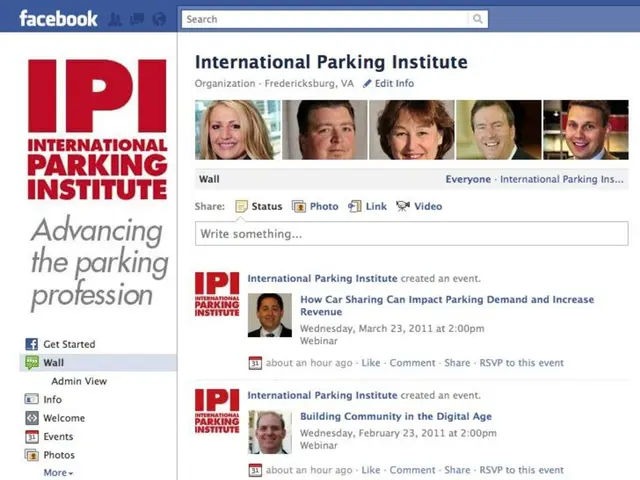Skyrocketing Measles Cases Projected for U.S. Over Next Quarter-Century with Lower Vaccination Rates
In the coming years, the U.S. could witness a scary future if the vaccination rate plummets, according to recent research published in JAMA. With anti-vaxxers lurking in high-level government positions, widespread ignorance about the gravity of measles, and a segment of the population that just isn't getting it, the situation looks grim.
A group of researchers from Stanford University ran a simulation to see what would happen if childhood vaccination rates started dropping. In an absolute nightmare scenario, they found that a 50% reduction in childhood vaccinations could result in an astounding 51.2 million measles cases over 25 years, as well as 9.9 million rubella, 4.3 million polio, and 197 diphtheria cases. This unfortunate period would lead to 10.3 million hospitalizations and a heartbreaking 159,200 deaths1.
The prospect of a 50% drop in childhood vaccinations is obviously awful and a relic of a time we should never want to return to, but what about a more moderate decline? Even just a 10% decrease in MMR immunizations could cause a massive spike in measles infections, with 11.1 million cases in the U.S. over the next 25 years. On the flip side, a mere 5% increase in vaccinations would mean the U.S. could see just 5,800 cases1. To achieve herd immunity for measles, the population needs a vaccination rate of around 95%. The researchers estimate the current vaccination coverage in their models to be between 87.7% and 95.6%1.
Immunization rates vary significantly from state to state. New York boasted an estimated childhood vaccination rate of 97.7% for the 2023-24 school year, while Idaho lagged behind with a rate of just 79.6%, according to the CDC3.
Before the measles vaccine came along in 1963, hundreds of thousands of Americans were struck with measles every year. Roughly 400-500 people would die annually from the disease, and it wasn't uncommon for tens of thousands of people to be hospitalized. One of the lesser-known dangers of measles is that it causes "immune amnesia," effectively resetting the immune systems of infected patients, making their bodies unable to fight off other infections5.
The U.S. is currently experiencing its worst measles outbreak in a quarter century, with nearly 800 cases reported across 25 states. Tragically, three people have already lost their lives to measles in 2023, including two children in Texas and an adult in New Mexico3.
Parents of one of the dead children who refused to vaccinate their daughter have come under scrutiny. In a statement to the Texas Tribune, they admitted they didn't regret their decision, pointing out that three of their other unvaccinated children were still alive. The parents of an 8-year-old girl who died in April claimed they didn't regret their decision to go unvaccinated, stating that she didn't actually die from measles but rather poor hospital care3.
This anti-vaxxer movement is gaining momentum, with figures like Robert F. Kennedy Jr. taking the helm. Kennedy, who was head of the Department of Health and Human Services from 2015 until 2023, now leads the fringe anti-vaccine organization Children's Health Defense3. Kennedy and his followers continue to peddle baseless claims that vaccines cause autism3.
To make things even scarier, Kennedy recently declared that he would finally reveal the "cause" of autism by the fall6. He also heads the Make America Healthy Again (MAHA) movement and is rumored to be working on a database of autism cases and private health records of Americans6.
Kennedy's cavalier attitude towards science and public health has earned him criticism, particularly when he suggested that many diseases were either brand new or not present when he was a child6. To put it bluntly, Kennedy's ideas are not only flawed but also dangerous, and they could cost millions of lives if not challenged.
In summary, the current anti-vaxxer movement, fueled by figures like Robert F. Kennedy Jr., poses a grave threat to public health in the U.S. If left unchecked, it could lead to an epidemic of preventable diseases and unnecessarily harm countless lives.
- Science predicts a dismal future for the U.S. if vaccination rates decrease significantly.
- Technology could play a crucial role in combating the rise of anti-vaxxers, with digital platforms used to educate people about vaccines.
- Health experts are concerned about the impact of chronic diseases, such as cancer and respiratory conditions, on healthcare systems in 2023.
- Gizmodo recently published an article about the effects of digital health tools on eye-health, hearing, and general health-and-wellness.
- Fitness-and-exercise apps are increasingly popular, with more people turning to home workouts and virtual classes amidst health concerns.
- Autoimmune disorders, like lupus and rheumatoid arthritis, are complex medical-conditions that require therapies-and-treatments to manage.
- Mental-health issues, such as anxiety and depression, are on the rise, with society's pressure and the impact of the pandemic taking a toll.
- Nutrition plays a vital role in overall health and can significantly impact chronic diseases, digestive-health, and skin-conditions.
- Cardiovascular-health is another area of concern, with medical research highlighting the importance of a balanced diet and regular exercise.
- Medicare policies are being debated to ensure the elderly have access to affordable healthcare, including vaccines and treatments.
- CBD is being studied for its potential in managing neurological-disorders, such as epilepsy and multiple sclerosis.
- Seeking therapies-and-treatments for various health issues has become easier with online-education platform's medical resources and self-development tools.
- Personal-growth can be fostered through mindfulness practices, helping people manage stress and cultivate a more balanced lifestyle.
- The ongoing wars-and-conflicts worldwide place a significant burden on public health, exacerbating issues such as malnutrition, communicable diseases, and displacement.
- Increased productivity at work can be achieved through career-development efforts, such as lifelong-learning, goal-setting, and skill-training.
- Policy-and-legislation have a crucial role to play in safeguarding public health, with stricter regulations needed for vaccine distribution and safety.
- Traffic accidents, like car-accidents, are a leading cause of preventable injuries and fatalities, with a need for stricter traffic rules and better vehicle safety, as discussed in Gizmodo's automotive section.
- Politics has a significant impact on public health, as decisions on healthcare funding, vaccinations, and environmental regulations are made based on political ideologies.
- Online-education has become increasingly important in the era of social distancing, with classes and seminars held virtually to continue learning.
- Job-search platforms are evolving to prioritize remote work opportunities and expanding skillsets, with competencies in technology and health sectors in high demand.
- General-news outlets provide crucial updates on the latest health trends, new studies, and breakthroughs in science and medicine.
- Crime-and-justice reports often highlight cases involving domestic violence, health fraud, and the impact of harmful substances on communities.
- Accidents, such as fires, can have a severe impact on public health, with research being conducted to develop more efficient early-warning systems.
- Education-and-self-development resources, like online courses and webinars, are becoming more interactive with the use of simulations and virtual reality technology.
- Learning about science, technology, and health can be a lifelong endeavor, with the ongoing advancements in these fields contributing to personal and global growth.
- Sports offer opportunities for fitness-and-exercise, with football, soccer, basketball, and baseball games encouraging a healthier lifestyle.
- Champions-league games attract a massive worldwide audience, shining a spotlight on the importance of teamwork, determination, and sportsmanship.
- The NFL, NHL, NBA, and MLB each have their own unique fan bases, with movements like Nike's Just Do It campaign emphasizing the connection between sports and personal growth.
- European leagues, such as Serie A, Laliga, Premier League, and the Champions League, have a significant impact on the economies and cultures of the countries they represent.
- American football, represented by the NFL, has become a cultural phenomenon, showcasing the passion and dedication of players and fans alike.
- The NBA has made strides in addressing various social issues, like racial inequality and mental-health awareness, through initiatives like the League's social justice coalition.
- College sports, such as the NCAAs' basketball and football, play an essential role in young athletes' development, providing a platform for academic and athletic achievements.
- WNBA players continue to advocate for women's rights, using their platform to champion gender equality and empower readers.
- The diphtheria vaccine, a key component of children's immunization regimens, is proof of the power of science and technology in preventing historical diseases, underscoring the importance of continued investment in these fields for a healthier future.








